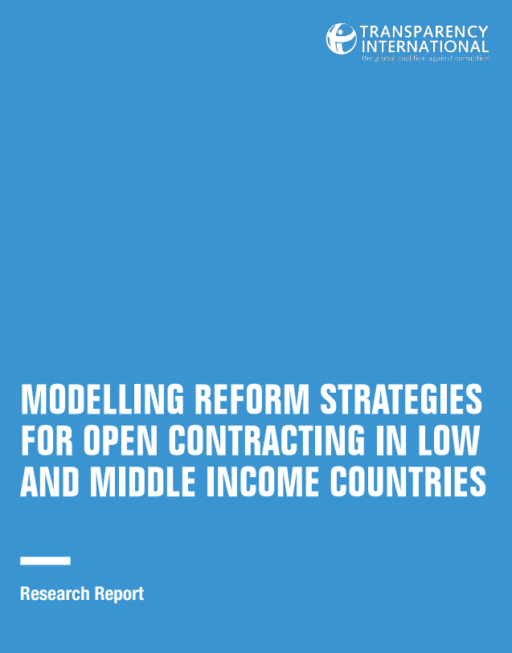Modelling reform strategies for open contracting in low and middle income countries
Description
This report aims to evaluate the effectiveness and fit of open contracting reforms to LMIC contexts and to provide recommendations on how and when countries should pursue open contracting reforms. This objective was broken down into the following questions on reform outcomes and reform drivers.
- How advanced and comprehensive is the legal framework for open contracting? How did it evolve in the last 10- 15 years?
- To what extent are the laws relating to public procurement transparency and accountability implemented? How did the comprehensiveness and quality of publicly available government contracting data evolve in the last 10-15 years?
- What is the political-economic context in which public procurement occurs? Who are the main actors in government and civil society, what are their power relations and interests? Which actors have driven or blocked open contracting reform?
- Which conditions and institutional capacities have facilitated or hindered public procurement transparency reform?
- Which reform strategies have proved most successful and unsuccessful in which contexts? What were the typical time frames and pathways for successful reform that can inform design of future advocacy strategies?
The methodology employed incorporates a number of data collection and analytical methods. This includes legislative mapping by tracing changes in the main laws governing public procurement and its transparency; procurement data collection and analysis of data quality and availability; over 100 key informant interviews (mostly online). Our findings were used to inform our analysis of the drivers of reform, in order to identify those reform strategies which worked and those which did not work. These successes and failures offer insights into effective strategies for advocates of open contracting reform, and into the types of strategy which are most suitable in given conditions.
We included nine LMICs which are at different stages of the reform process regarding transparency in public procurement in this research: Bangladesh, Indonesia, Kenya, Nepal, Nigeria, South Africa, Tanzania, Uganda, and Zambia. Their variation in progressing on legal frameworks for open contracting and publishing open contracting data become apparent in light of our legal and data mappings.
The detailed procurement legislation scores (EuroPAM template) are available for download here.
Authors
Isabelle Adam, Elizabeth Dávid Barrett, and Mihály Fazekas
Date
04/03/2021
Tags
 Download PDF
Download PDF
